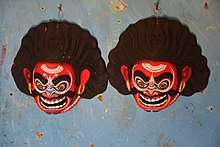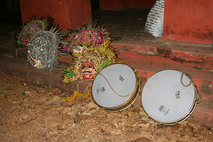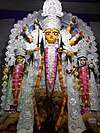Chhau dance
Chhau dance, also spelled as Chau or Chhaau, is a semi classical Indian dance with martial, tribal and folk traditions,[1] with origins in eastern India. It is found in three styles named after the location where they are performed, i.e. the Purulia Chau of Bengal, the Seraikella Chau of Jharkhand, and the Mayurbhanj Chau of Odisha.
.jpg)
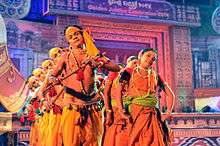
The dance ranges from celebrating martial arts, acrobatics and athletics performed in festive themes of a folk dance, to a structured dance with religious themes found in Shaivism, Shaktism and Vaishnavism. The costumes vary between the styles, with Purulia and Serakeilla using masks to identify the character.[2] The stories enacted by Chhau dancers include those from the Hindu epics the Ramayana and the Mahabharata, the Puranas and other Indian literature.[2][3]
The dance is traditionally an all males troupe, regionally celebrated particularly during spring every year, and may be a syncretic dance form that emerged from a fusion of classical Hindu dances and the traditions of ancient regional tribes.[3] The dance is amazing and brings together people from diverse socio-economic backgrounds in a festive and religious spirit.[2][3]
Etymology
Chhau is a folk dance of Rarh region. It may have been derived from Sanskrit Chāya (shadow, image or mask).[3][4] Others link it to the Sanskrit root Chadma (disguise), yet others such as Sitakant Mahapatra suggest it is derived from Chhauni (military camp, armor, stealth) in Odia language.[5][6]
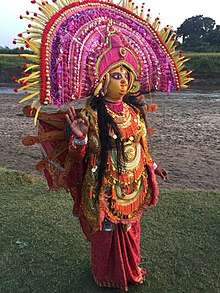
Features of Chhau
The Chhau dance is mainly performed during festivals in the region of Jharkhand, West Bengal and Odisha, especially the spring festival of Chaitra Parva and in which the whole community participates.[4] The Purulia Chhau dance is celebrated during the Sun festival.[7]
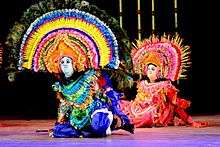
Masks form an integral part of Chhau dance in Purulia and Seraikella styles.[2] The knowledge of dance, music and mask-making is transmitted orally.[8] The Chhau dance found in northern Odisha does not use mask during the dance, but they do when the artists first appear on the stage for introduction to the audience.[9]
The two styles of Chhau dance that use masks, blend within it forms of both dance and martial practices employing mock combat techniques (called khel), stylized gaits of birds and animals (called chalis and topkas) and movements based on the chores of village housewives (called uflis).[7] This form of the Chhau dance, states Mohan Khokar, has no ritual or ceremonial meaning, it is a form of community celebration and entertainment.[4]
The dance is performed by male dancers, at night in an open space, called akhada or asar. The dance is rhythmic and set to traditional folk music, played on the reed pipes mohuri and shehnai.[2] A variety of drums accompany the music ensemble including the dhol (a cylindrical drum), dhumsa (a large kettle drum) and kharka or chad-chadi. The themes for these dances include local legends, folklore and episodes from the Ramayana and Mahabharata and other abstract themes.[2]
Three styles of Chhau
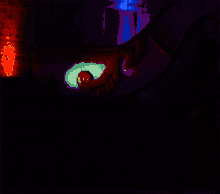
The Seraikella Chhau developed in Seraikela, the present day administrative headquarters of the Seraikela Kharsawan district of Jharkhand, the Purulia Chhau in Purulia district of West Bengal and the Mayurbhanj Chhau[10] in Mayurbhanj district of Odisha. The most prominent difference among the three subgenres is regarding the use of masks. While, the Seraikela and Purulia subgenres of Chhau use masks during the dance, the Mayurbhanj Chhau uses none.[7][11]
The Seraikella Chhau's technique and repertoire were developed by the erstwhile nobility of this region who were both its performers and choreographers, and in the modern era people from all backgrounds dance it.[7] The Seraikella Chhau is performed with symbolic masks, and the acting establishes the role the actor is playing.[7][12] The Purulia Chhau uses extensive masks shaped in the form of the character being played; for example, a lion character has a face mask of lion and body costumes too with the actor walking on all fours.[7] These masks are crafted by potters who make clay images of Hindu gods and goddesses and is primarily sourced from the Purulia district of West Bengal.[13] In the Mayurbhanj Chhau is performed without masks and is technically similar to the Seraikella Chhau.[7][12]
Recognition
In 2010 the Chhau dance was inscribed in the UNESCO's Representative List of the Intangible Cultural Heritage of Humanity.[14]
The Government of Odisha established the Government Chhau Dance Centre in 1960 in Seraikella and the Mayurbhanj Chhau Nritya Pratisthan at Baripada in 1962. These institutions engage in training involving local gurus, artists, patrons and representatives of Chhau institutions and sponsor performances. The Chaitra Parva festival, significant to the Chhau Dance, is also sponsored by the state government. The Sangeet Natak Akademi has established a National Centre for Chhau Dance at Baripada, Odisha.[15][16]
In popular culture
The Hindi film Barfi! has several scenes that features the Purulia Chhau in it.[17]
Chhau mask
Purulia Chhau Dance is listed on UNESCO's world heritage list of dances.[18] The main difference between the Purulia Chhau and Odisha Chhau is in the use of the mask. Purulia Chhau uses masks in dance, but Odisha does not have masks thereby adding facial expression with body movements and gestures.[19] Traditionally, the chhau dance is held during mid-march when one agricultural circle ends and a new circle begins.[20] Purulia Chhau dancers wear the earthy and theatrical mask which represent the mythological characters. After making the shape of mask with clay, it is coloured and decorated with Shola and other things.
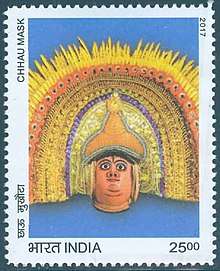
The Chhau mask of Purulia is registered under Geographical Indications.[21] As the basic difference of Purulia Chhau the mask is unique and traditional.
These chhau masks are made by the artists by the Sutradhar community. The making of a mask goes through various stages. 8-10 layers of soft paper, immersed in diluted glue, are pasted one after another on the mould before the mud mould is dusted with fine ash powder. The facial features are made of clay. A special layer of mud and cloth is applied and the mask is then sun-dried. After this, the mould is polished and the second round of sun drying is done before separating the layers of cloth and paper from the mould. After finishing and drilling of holes for the nose and eyes, the mask is colored and decorated.[22][23]
Gallery
.jpg) Chhau dance artist-female
Chhau dance artist-female.jpg) Chhau dance artist-male
Chhau dance artist-male.jpg) Chhau dance artist-male
Chhau dance artist-male.jpg) Chhau dance artists
Chhau dance artists.jpg) Chhau dance artist
Chhau dance artist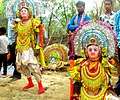 Chhau Dancers in a village of Jharkhand
Chhau Dancers in a village of Jharkhand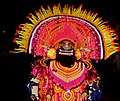 Chhau dancer with demon mask performing at night
Chhau dancer with demon mask performing at night A chhau dancer performing among the villagers in Jharkhand
A chhau dancer performing among the villagers in Jharkhand A Mayurbhanj Chhau music troupe performing
A Mayurbhanj Chhau music troupe performing
Notes
- Williams 2004, pp. 83-84, is a semi classical Indian dance with martial, tribal and folk origins. The other major classical Indian dances are: Bharatanatyam, Kathak, Kuchipudi, Kathakali, Odissi, Manipuri, Satriya, Yaksagana and Bhagavata Mela.
- Chhau dance UNESCO, Representative List of the Intangible Cultural Heritage of Humanity
- Claus 2003, pp. 109-110.
- Mohan Khokar (1984). Traditions of Indian classical dance. Clarion Books. pp. 184–186.
- Claus, p. 109
- "The Chhau". Seraikela-Kharsawan district official website. Archived from the original on 10 April 2009. Retrieved 15 March 2009.
- Claus, p. 110
- From: NOMINATION FILE NO. 00337 FOR INSCRIPTION ON THE REPRESENTATIVE LIST OF THE INTANGIBLE CULTURAL HERITAGE IN 2010, UNESCO 2010
- Claus 2003, p. 110.
- "CHHAU DANCE OF MAYURBHANJ". Archived from the original on 16 March 2012. Retrieved 20 May 2012.
- "Famous Folk Dance: "Chau"". Purulia district official website. Archived from the original on 2 June 2013. Retrieved 15 March 2009.
- Mohan Khokar (1984). Traditions of Indian classical dance. Clarion Books. pp. 186–187.
- Pani, Jiwan (1986). World of Other Faces - Indian Masks. New Delhi: Publications Division, Ministry of Information and Broadcasting, Government of India. pp. 19–20.
- http://www.unesco.org/culture/ich/index.php?pg=00011 |title=Intangible Heritage Lists
- "Chhau Centre, Baripada/Jamshedpur". Sangeet Natak Akademi. Archived from the original on 13 March 2012. Retrieved 26 April 2013.
- "Chhau centre at Baripada finds favour with Union Ministry". The Hindu. 15 July 2012. Retrieved 26 April 2013.
- "Film Review | Barfi!". HT Mint. 13 September 2012. Retrieved 26 April 2013.
- "Chhau Dance: West Bengal's Performing Art Treasure". Utsavpedia. 30 July 2015. Retrieved 12 February 2018.
- "The Official Website of Purulia District". purulia.gov.in. Retrieved 12 February 2018.
- ":::::: Daricha Foundation ::::::". www.daricha.org. Retrieved 12 February 2018.
- "Bengal handicrafts to get new fillip with GI tags". The Hindu. PTI. 16 August 2016. ISSN 0971-751X. Retrieved 15 May 2018.CS1 maint: others (link)
- https://static1.squarespace.com/static/5590e1c1e4b01cfd84ef7264/t/56bd94ae7da24fd5476fbc2e/1455264959070/Masks+of+Bengal.pdf
- "The Mask". Biswa Bangla. Retrieved 12 February 2018.
References
- Asutosh Bhattacharya, Chhau dance of Purulia. Pub. Rabindra Bharati University, 1972.
- Barba, Eugenio; Nicola Savarese (1991). A dictionary of theatre anthropology: the secret art of the performer. Routledge. ISBN 0-415-05308-0.
- Claus, Peter J.; Sarah Diamond; Margaret Ann Mills (2003). South Asian folklore: an encyclopedia. Taylor & Francis. ISBN 0-415-93919-4.
- Claus, Peter J.; et al. (2003), South Asian folklore: an encyclopedia, Routledge, ISBN 0-415-93919-4
- Williams, Drid (2004). "In the Shadow of Hollywood Orientalism: Authentic East Indian Dancing" (PDF). Visual Anthropology. Routledge. 17 (1): 69–98. doi:10.1080/08949460490274013. S2CID 29065670.CS1 maint: ref=harv (link)
External links
| Wikimedia Commons has media related to Chhau dance. |
